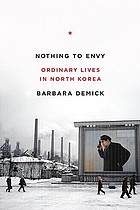Apparently life in North Korea is pretty grim. Most people don't even have electricity for more than a few hours a day, as you can see from this image that opens Nothing to Envy.
You'd think that would lead to a lot of teenage pregnancy, but according to the North Korean defectors Demick interviewed in South Korea, there's not a lot of premarital sex in the dark nation. Two of her subjects dated from their teens through early twenties without doing more than kissing, and it took them nine years to get to that point. It's just as well that the culture is so straight-laced, since the country can't feed the citizens it has. According to Demick, "Even in the best of times North Korea can produce only about 60 percent of the food needed for its population, and it currently cannot afford to import the rest." And these are not the best of times for North Korea.
Knowing almost nothing about North Korea, I was very engaged with Nothing to Envy and talked about it a lot with friends and family. (Thanks to birthday mate and Barnard Library zine intern Lauren Orso for telling me about it!) Even though it's pretty clear that North Korea is extremely fucked, I was occasionally put off by biased sounding writing:
The old class structure drew heavily on the teachings of Confucius, who believed that humans fit strictly into a social pyramid. Kim Il-sung took the least humane elements of Confucianism and combined them with Stalinism.
North Korea was (and remains as of this writing in 2009) the last place on earth where virtually everything is grown on collective farms. The state confiscates the entire harvest and then gives a portion back to the farmer.
Confiscates is a little loaded, don't you think?
Even so, the concept that the nation's children and workers are fed things like "thin soup made of salt and dry leaves," especially when even that sustenance dries up.
Here are a couple of other choice quotes:
All teachers were required to play the accordion--it had been her final test before graduation. It was often called the "people's instrument" since it was portable enough to carry along on a march to a construction site or for a day of voluntary hard labor in the fields--nothing like a rousing march played on the accordion to motivate workers in the field or on the construction site.
Decades after the rest of the Communist world capitulated to capitalism, Kim JOng-il is trying to run the economy the same way his father did in the 1950s. If anything, he's been taking the country on a great leap backward, rolling back the market reforms of the past decade.
Demick focuses most of the bio/history on six defectors--the two young hand-holders, a doctor who had to get out of pediatrics because she couldn't stand seeing her patients all die of malnutrition, an orphan in his late teens, and a patriotic grandmother and her daughter--which is a great way to tell the real story she wanted to tell.
CATS: None, but it's just as well. Household pets are unlikely to thrive in a famine


Comments
laura (not verified)
Tue, 02/15/2011 - 6:19pm
Permalink
I read this a year or so ago
I read this a year or so ago and found it fascinating. I'd agree with the anti-communist bias, although that's hardly surprising. What worried me more was the sort of dictatorship voyeurism aspect, as if this level of suffering is just a sort of entertainment for us. Then again, that's a problem in a lot of genres -- it's hardly limited to books about regimes.